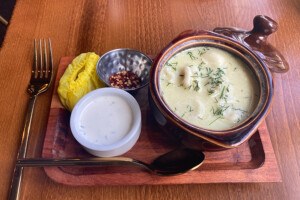Provenance Is Philly’s Most Ambitious Restaurant — If It Can Survive
Chef Nich Bazik has ruffled feathers — and spent a ton of cash — in his audacious quest to build a Michelin-grade restaurant more or less from scratch. Is that what Philadelphia wants?
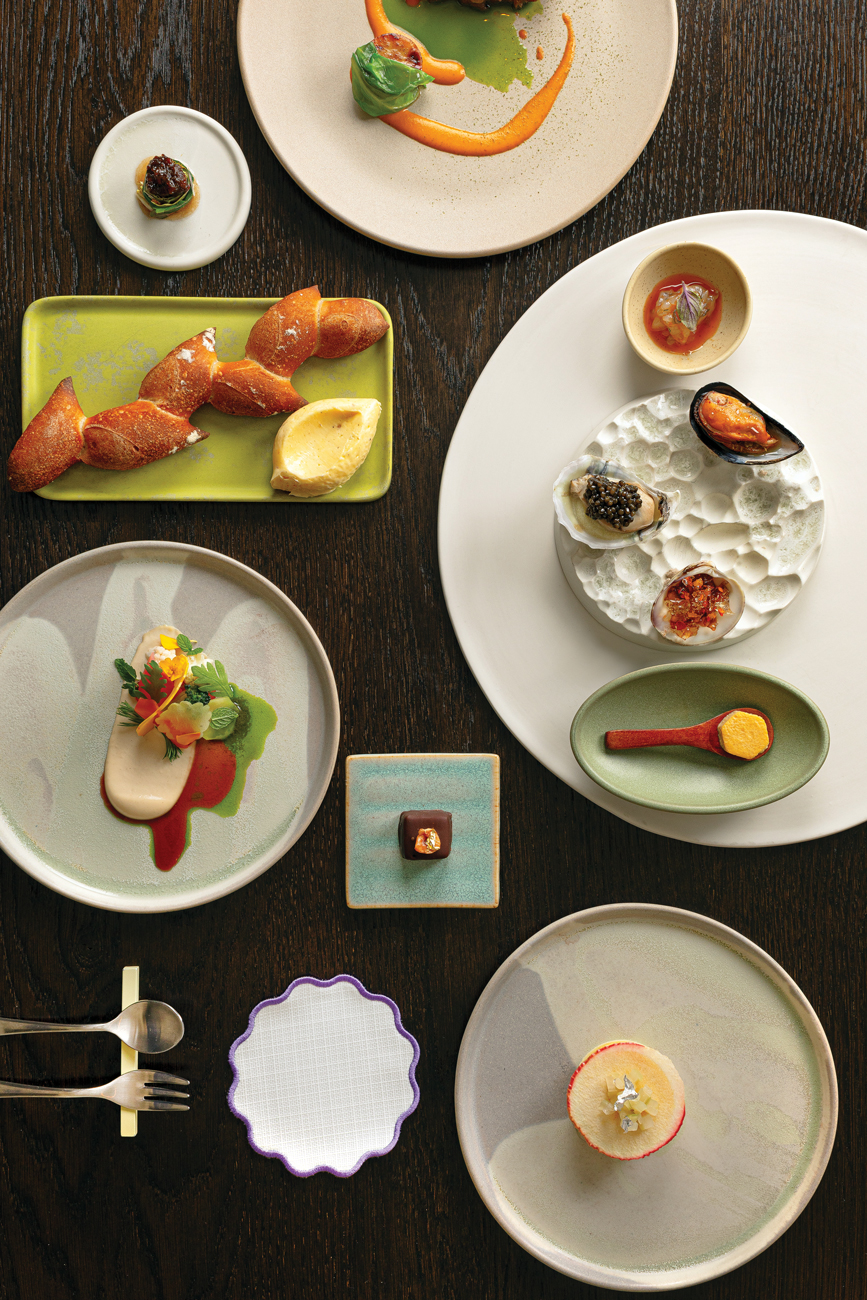
Just a few of the 25 courses Provenance serves each night. / Photography by Breanne Furlong
Editor’s note: This story was published in the December 2024/January 2025 issue. On November 18, 2025, Provenance earned a Michelin star.
In the kitchen at Provenance, there’s no music. There’s no shouting, no raised voices. There’s no smell to the place that isn’t the non-smell of scrubbed tile and bright stainless.
In the lowboys, everything is label-out. In the reach-ins everything is spaced and bagged and organized. On the service bar, polished cocktail shakers stand like soldiers at attention, their lids next to them in a perfect line. Most of the time, the only sound is the constant, loud pull of the exhaust fans like a monster breathing. A jet taxiing, ready for takeoff.
There is no universe in which opening a restaurant is easy, but in Philadelphia? In a 200-year-old rowhouse in a historic district? That’s like paying cash in advance for a thousand headaches down the line. But that’s exactly what chef Nicholas Bazik has done. And he didn’t just open a restaurant. He opened the most ambitious, the most counterintuitive, the most talked-about restaurant in the city right now, with an ever-changing 25-course tasting menu, top-of-the-market product sourced from all over the globe, and a stove priced like a luxury car. What he has built is a laboratory clean room where excellence is the only goal: where the future of dining in Philadelphia is being described and decided every single night.
During prep, I move through the place like a ghost. A curiosity noted, if at all, only from the corner of the eye. Everyone here is busy. Polite, but focused. And I’ve come to Provenance to answer just one question: Is Nich Bazik crazy or not?
It’s Sunday. Market day. Provenance has been open for five weeks and, on the phone from his empty dining room, Nich is talking to me about hate. “… and he said, ‘They told me to cook with hate because it’ll make you cook faster.’”
Seriously?
“Yeah, can you believe that? Cook with hate. I mean … what do you say to something like that? What do you do with that?”
Then quiet.
Nich’s sous chef told him that story — told him about a place where the chef he worked under told him he had to cook with hate. The restaurant is not important, but trust me, you’d know it. Because there are parts of this industry — big, shiny, fancy parts, the parts that end up in magazines and lists of the best restaurants in the world — where that’s how kitchens still operate. Cook with hate. It’ll make you faster.
But Nich doesn’t run Provenance that way. Some of the best cooks in the city are working here. An all-pro team that would be the envy of any kitchen. And a lot of them came just because Nich asked.
“Look,” he says, “I want my seats full. All 25 of my seats, all the time. I’m not naive. I know this is a business. But I can run my kitchen void of the machismo bullshit. We’re not this militant machine, regimented and …”
He trails off again.
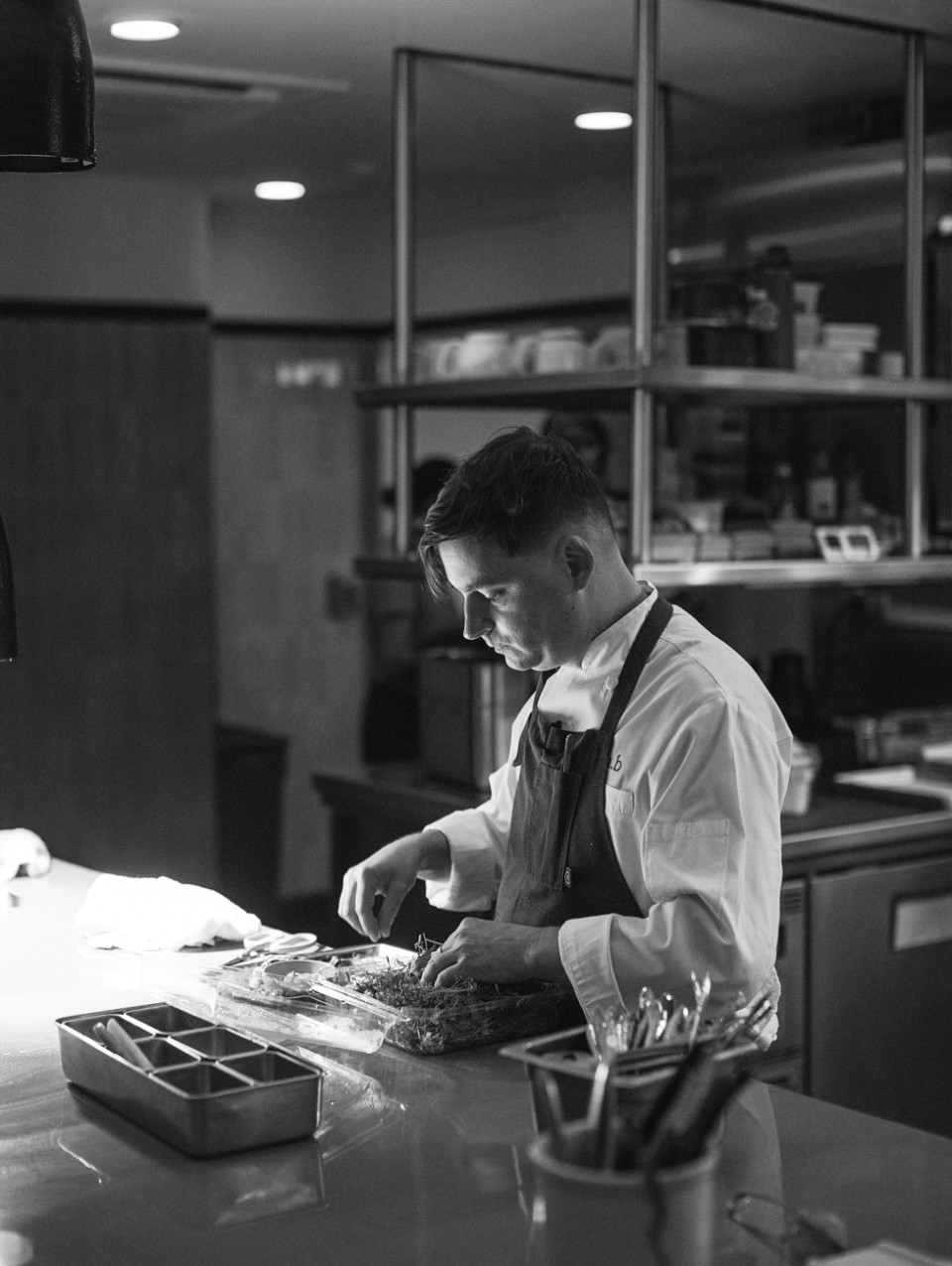
Provenance chef Nich Bazik
This happens a lot when we talk. Partly because Nich is still writing the narrative of Provenance in his head — this new, strange, beautiful place, complicated and antithetical to so much we accept as fact about the restaurant industry. Provenance serves a 25-course tasting menu, four nights a week, to two turns of a 25-seat dining room. That’s it. Unexpected but not unfamiliar is the way he describes it. A marathon run as a sprint is how some people talk about the menu. But no one says it isn’t amazing. And if everything works out precisely the way Nich has planned it, 10 years from now people will talk about Provenance as the start of something new. It’ll be in the magazines and the lists of the best restaurants in the world.
“We can be very familial, but elegant,” he continues. “Refined. Serious about what we do. We can cook like we have all the accolades already, all the awards, because it’s all bullshit anyway. We’re going to operate like we’re the best restaurant in the country.”
Right up until they are. Or until it all falls apart. Because, really, it could go either way right now. There’s a start-up energy at Provenance in October. A sense that the future is right there for the taking and that the intent and the vibes are just too good for anything to go wrong. But Move fast and break things sounded great right up until it wasn’t, and Elizabeth Holmes seemed like a visionary for a little while. Disruption rarely happens without something getting broken along the way. Sometimes it’s the status quo, sure. But sometimes it’s the disrupter.
“You have to have a certain amount of self-confidence, bordering on delusion, to do this kind of thing,” he says. Then he laughs. “The chair I’m sitting in right now is a $1,200 chair.”
This almost never happened. All of it is the product of bad luck, freak chances, spite, hard work. An accretion of events that put Nich Bazik in that room, on that day, in that chair, on the phone with me. That call? It was supposed to be a get-to-know-you kind of thing. Ten minutes, tops. We ended up talking for more than two hours.
And Nich was never even supposed to be a chef. An academic — that was his path. Possibly a rock star. He thinks maybe he would’ve ended up here anyway, but I disagree. In the kitchen, maybe. But not here-here.
Born and raised in Harleysville, Nich is 38 now. He was a smart kid, sensitive, fascinated by history and books and music. As a boy, he was a Civil War reenactor and spent years dressing up, playing in a fife and drum corps, inhabiting moments that were not his own.
Nich went away to college in 2004 — to Green Mountain in Vermont, where he majored in theology and history, specifically “interfaith dialogue” and the period between 1600 and 1871, which was the end of the Franco-Prussian war. Real lightweight stuff.
The plan, as Nich explains it, was to finish the bachelor’s degree, then a master’s, then a PhD, then teach. It was an academic track, made for the slow production of suede elbow patches, thick books, and white male ennui. Only Nich wasn’t sure that’s what he wanted.
So let’s pause a moment. Because here — in the green of the Taconic Mountains, amid Vermont’s verdant hippies — something changes. Nich comes to a fork. Two roads diverging in a yellow wood.
And, for a little while anyway, he tries to walk both.
The first road goes like this:
Nich has a band — roots-heavy indie folk with a lot of banjos, vests, and scarves. They’re called Your Midway Host, and they’re good. Traces of them still linger in odd corners of the Internet.
Nich is the lead singer, the songwriter. He plays guitar. He leaves Green Mountain and transfers to Temple, where he continues to pursue the same degree while also playing gigs around the region. The band gets a little notice. They play shows at World Cafe Live and start drawing crowds.
Your Midway Host gets a licensing deal, finishes a full-length album, and has it mastered at Abbey Road Studios in London. In Philly, the band is gearing up to go on the road to promote the album.
Then, five days before they’re scheduled to start their tour, Nich is riding his bike and gets into an accident and breaks his hand. The tour is canceled, and Your Midway Host vanishes into the collective memory of the mid-aughts. So Nich Bazik leaves Temple, leaves Philly, returns to Vermont and his studies. He writes a thesis on faith in the lives of Napoleon’s marshals and has no regrets.
“Bullshit,” I tell him.
“I would’ve ended up cooking regardless,” he says, the shrug in his voice so plaintive I can feel it over the phone.
But at the same time, something else is happening too. Nich’s other road. And it goes like this:
Nich has started working in restaurants — small, temporary gigs, the kind you get when you’re in a working band with dreams of making it big.
So after Nich, 19, leaves Green Mountain and transfers to Temple, he’s also working the counter at Miel Patisserie and the floor at James on 8th Street in Bella Vista. He’s a food runner. He has never cooked professionally. But he sees Jim Burke in the kitchen, with Andrew Wood as his sous, and some tiny, powerful explosive goes off in his brain.
This, he thinks. I could do this.
Except no, he can’t. Because he’s gonna be a rock star. And also, he has no idea how to do this. But that doesn’t slow him down even a little. He tells Jim and his wife, Kristina (a pastry chef who helped to open Miel back in the day), that he wants to cook, and they say, OK, so cook.
So that’s what Nich does. Jim and Kristina are living in an apartment upstairs from the restaurant and Nich cooks them dinner. He can’t remember exactly what he cooked for them — he recalls chanterelles and lamb, maybe? — but he knows that, ultimately, it didn’t really matter. “They wanted to see how my mind worked,” he says. That was the important thing. Burke had no formal culinary training. He had an economics degree from Franklin & Marshall and came up the hard way — working in dozens of restaurants, reading everything he could get his hands on. What he wanted to know was how this part-timer with a folk band and half a history degree thought about food.
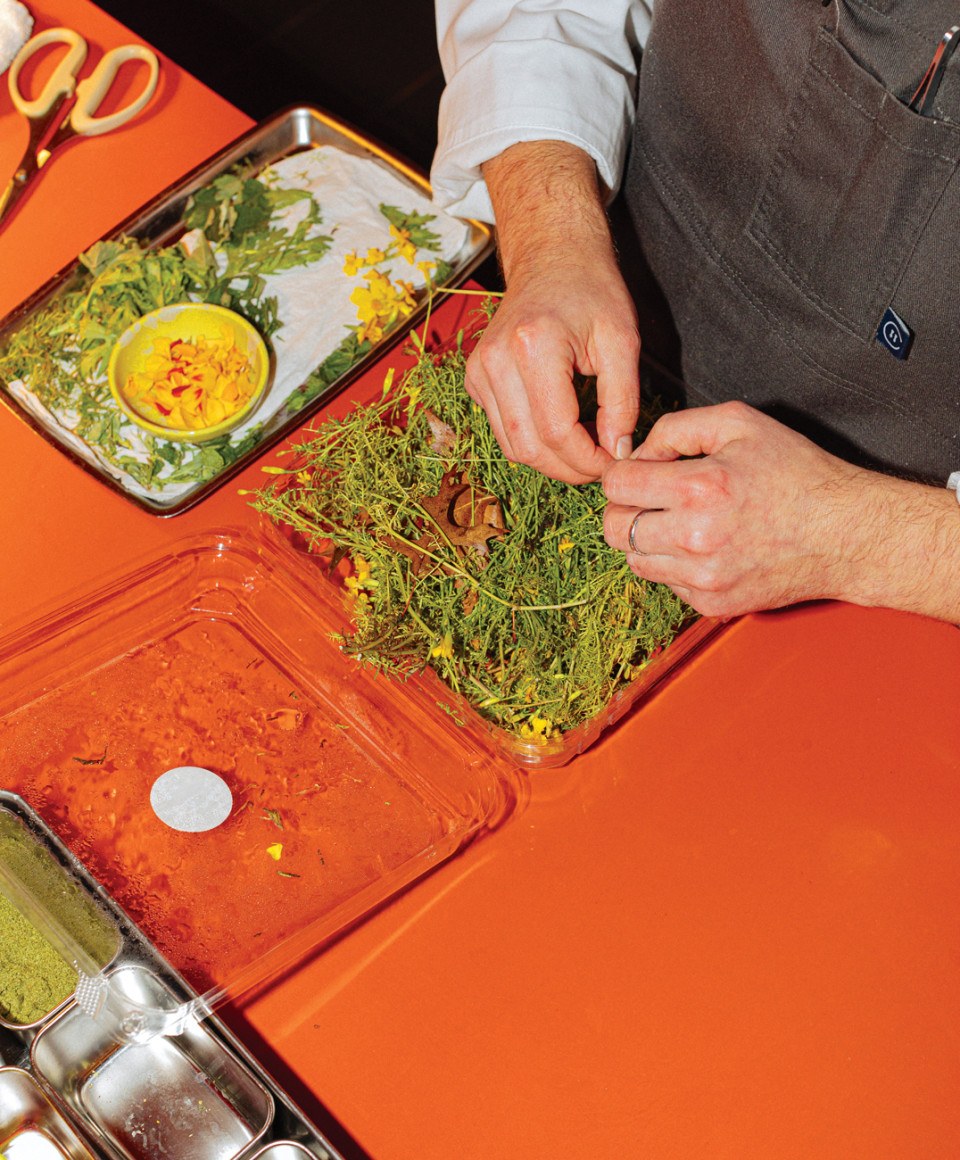
Prep at Provenance
And apparently, the way Nich thought was impressive enough because the Burkes offered him a job. He could work in the kitchen in the summer, and “[Jim] let me ask every dumb question I could think of at the pass.”
So Nich started to learn. He geeked out over ingredients, memorized recipes. James was a serious restaurant — nice glassware, excellent ingredients, a European wine list, and a pastry program — but it was also fun. A refutation of the Philly tendency toward scrappy BYOs doing lowbrow takes on upscale classics that never felt preachy.
And then, one day Nich is riding his bike in the city and he gets into an accident. He breaks his hand, can’t hold a knife, can’t cook, can’t do anything. So he walks away from James, leaves Temple, leaves Philly, returns to Vermont and his studies. He writes a thesis on the palate — a case study on an eight-course tasting menu, contrasting commodity versus organic ingredients.
But he can’t stop thinking about the kitchen.
This is later. I’m standing awkwardly in Provenance’s basement prep kitchen, watching Nich and his crew assemble the building blocks of tonight’s menu. RJ is tying lettuce rolls, putting rainbow-colored radishes and cucumbers through the mandoline. He’s an intern from the Drexel restaurant school, been here since opening night. Nich lays down a cutting board beside RJ and starts peeling knuckles of foraged black Burgundy truffles with a small knife. At the other end of the stainless, Fredo is hunched over his cutting board. He tells me he recently came here from Lark.
Around the corner, Abby Dahan — Provenance’s pastry chef — is running through her prep. Once upon a time, she was the pastry chef at Parc, worked at the Park Hyatt in Chicago, then ran pastry for the entire Schulson Collective for a couple of years. I step aside for a minute and ask her how she ended up here, with Nich.
“I mean, look,” she says, and does a little half-turn, one hand out, showing off a pastry section that’s bigger than some entire restaurant kitchens. She’s got a Unox Cheftop combi oven, brand new. A single-burner Avantco induction cooktop. Workhorse stand mixer. Racks of coolers. We talk for a couple of minutes while she’s waiting on a pan full of apple confit to cook down — about Philly chefs and kitchens, about the lack of real pastry departments, and about Nich.
“He had this dream,” she tells me, “and he was building it.” Building Provenance the space and Provenance the idea, both at the same time. “He was just like, ‘Come here, and let’s just make something good.’”
Nich never graduated from Green Mountain. He left three credits shy of his degree and came right back to Philly.
“I wasn’t into a career in academia,” he tells me. “I really wanted to cook.”
So he did a stage at Snackbar under John Taus. In 2009, after leaving school, he did another stage at Fork under Terence Feury, and it went well enough that Terence hired him on full time, working morning garde-manger with a young Omar Tate. Andrew Wood (from James) was on the line as sous chef. Terence worked the fish station himself every night.
He did a year at Fork, exactly. And at that point, Omar was already gone. Andrew was leaving to open what would become his award-winning farm-to-table restaurant, Russet. Even Terence would be out the door soon, headed for New Jersey and Tavro 13 in Swedesboro.
Nich followed Andrew to Russet and worked there with him, and then picked up extra summer hours at the Diving Horse in Avalon.
“I worked seven days a week to prove to myself I could do it.” Because the chefs he’d known? They were always at work. Fourteen-hour days, seven days a week — that was normal if you wanted to run a place of your own. And Nich did. From the very beginning, that was his end point. The goal. “So I might as well get the reps in.”
Later, he would fill his days off staging for Peter Woolsey at Queen Village’s Bistrot La Minette — a gorgeous little French farmhouse restaurant with mustard-colored walls and excellent lapin roti. It was exactly what Nich was looking for: very French, very classical, very concerned with technique. And when Peter hired him away from Russet, he was happy. He came on as lead line cook. Two weeks later, he was Peter’s sous chef, running the day-to-day, writing the brunch menu.
“I loved it,” Nich says. “Loved the grind, loved having some modicum of control.”
And by some modicum of control, what Nich really means is more control than anyone had really offered him. Because a sous chef doesn’t really make decisions. A sous executes orders. But Nich wasn’t satisfied with those … limitations.
“It would come to some short, sharp conversations when [Peter] saw that I’d completely changed some things,” Nich tells me. And he laughs about it now. Because now, he can. But in the moment, he was getting yell-y. Short-tempered. Angry when people didn’t immediately understand what he thought was a better way to do things. He was smart, but still a little bit green.
At La Minette, he and Peter had been talking about opening a second restaurant. Something small, restrained, classy, with a good wine list and a focus on making great French food.
What Nich got instead was the chef de cuisine job at La Peg — a loud, disjointed, 160-seat brasserie that opened in 2014 in the FringeArts building under the Ben Franklin Bridge with a staff of 20, two sous chefs, a full pastry department, a beer garden, and a something-for-everyone menu that included onion soup, beef tartare, burgers, pho, and bar snacks.
It wasn’t the plan, Nich says. Further, it was a situation that he was by no means ready for. It was too big, too complex, with too much staff and too many moving parts. He’d be gone in just over a year.
On the phone, Nich and I talk about what went wrong at La Peg. He says to me, “I could see the utility in this failure,” and then the conversation mutates into a long story about plumbing.
Stick with me.
At Provenance, nearly everything has been rebuilt from the bones up. The space had been Xochitl since almost before Nich started cooking, but when he took ownership, he gutted the place. So the plumbing is new. All of it. And recently, they’d had a problem with their drains at the bar. This infuriated Nich because he’d designed this place so exactly that kind of thing would never happen.
“We’ve all worked at restaurants where shit just doesn’t work,” he says. “Like, where you didn’t have the things you needed or where the chef would ask, Hey, why isn’t this done? And the sous chef would say, Well, the oven is broken, and someone would have to fix it, but then, in a few days, it would just break again.”
That’s disrespectful, according to Nich. It’s a chef’s job — his duty — to provide his staff with the things they need to do the job he’s asking them to do. So when he designed Provenance, he did it with the equipment foremost in his mind. The way he looked at it, if the equipment was the best, most dependable equipment he could buy and the infrastructure was all new and built to last, then any errors that occurred would have to be human ones, not mechanical. And human errors we can learn from and correct.
It’s one of those ideas that, when you say it out loud, feels strange in your mouth. There’s something so calculating about it, you can’t help but wonder if Ayn Rand thought of it first.
And that’s because buying good gear and building strong systems will limit mechanical failures, yes. But in a working kitchen, what you’re ultimately left with is a bunch of squishy, bumbling, occasionally illogical disaster muppets in white jackets running around in a stainless-steel box filled with knives, hot fat, and fire. Shit is gonna break.
So a plumber comes and takes a look. They tell Nich that the pipes are fine, but someone has washed debris down one of the water drains and that has backed everything up. Which, as it turns out, is a mechanical failure and a human error, one caused by the other.
“I’m learning,” Nich says. “Now, I try to mitigate the disasters I can control. The rest of it? Well …”
After La Peg, Nich went to work at Lacroix under chef Jon Cichon. He did a year, learned every lesson he could, then walked. Next, he took an exec chef gig at the Good King Tavern because it was a small French bistro with passionate owners (father/daughter team Bernard and Chloe Grigri) who were willing to give him control over the kitchen. He did well there. Moved on.
“It was calculated,” Nich explains. “It was all very calculated so I could be the most rounded manager, the most rounded cook.” La Peg had taught him what he didn’t want to do. So now, Nich was doing what he did best: He was taking himself back to school.
In 2018, he accepted a position as culinary director at 13th Street Kitchens — Mike and Jeniphur Pasquarello’s restaurant group — which at that point included two Café Lifts, Kensington Quarters, KQ Burger, Prohibition Taproom, and Bufad, a Neapolitan-style pizzeria. It was a big jump — multiple locations, multiple kitchens, lots of staff. He would oversee the restructuring of Kensington Quarters and the opening of La Chinesca. 13th Street was where he learned the back-office paperwork piece required for running a successful restaurant: how to manage, how to budget, how to negotiate problems using numbers. But there was a catch.
“Hiring me as culinary director was predicated on me being able to open my own restaurant,” Nich says. Except, again, things didn’t work out that way. Concepts were being developed; spaces seemed right, up until they didn’t. And there was always, always, some immediate disaster that needed attention just to keep the wheels turning and the plates moving.
On the phone, Nich sighs. Always the historian, he’s tracing a thread of consequence in his head — how one thing led to another to another and, ultimately, put him where he is now: in this beautiful dining room with its dark woods and custom soapstone chef’s counter, sitting in a $1,200 chair.
“They always saw me as the guy who’s going to work really hard,” he says. “Who’s going to do the job really well. So they dangle the carrot just a little …”
The conversation is no longer solely about 13th Street or Good King or La Peg or La Minette. It’s about everything. It’s about 18 years in the restaurant industry spent as the guy behind the guy.
“But what they don’t see is, I’m taking so much more from you than you’re taking from me.”
In 2022, he sat down for coffee with Andrew Eisenstein, a real estate developer who owned a building at 408 South 2nd Street — the 200-year-old rowhouse that used to be Xochitl, Michael Solomonov’s first restaurant. The space was a mess. There was still food in the lowboys, trash on the floors. The utilities were an incestuous mess.
But Nich liked Andrew. They spoke a similar language. Every month, Andrew would fly off to eat at some Michelin-starred restaurant somewhere, and he would send reviews back to Nich, so, blindly, Nich signed. He didn’t have any funding or partners. He says Andrew took care of the key money, negotiated rent abatement and tenant improvements. Enough to get him in the door.
And just like that, Nicholas Bazik was a restaurant owner.
It would take two years for Provenance to open. None of it went smoothly.
At the restaurant, Nich walks me from room to room. He opens every door, pokes into every closet. He shows me the dining rooms — 11 seats at a counter looking directly into the kitchen, two four-tops in a side room with art by ceramics artist Sunkoo Yuh, six more seats at a table downstairs in the wine cellar where, once upon a time, Questlove used to DJ for private parties.
Nich got the keys to 408 South 2nd Street in August of 2022. Normally, when designing a place from the ground up, a restaurateur will squeeze seats into every available inch of space because seats equal money. This generally breaks down to something like 60 percent dining space, 40 percent for everything else — kitchen, prep, storage, dish pit, service, office, whatever.
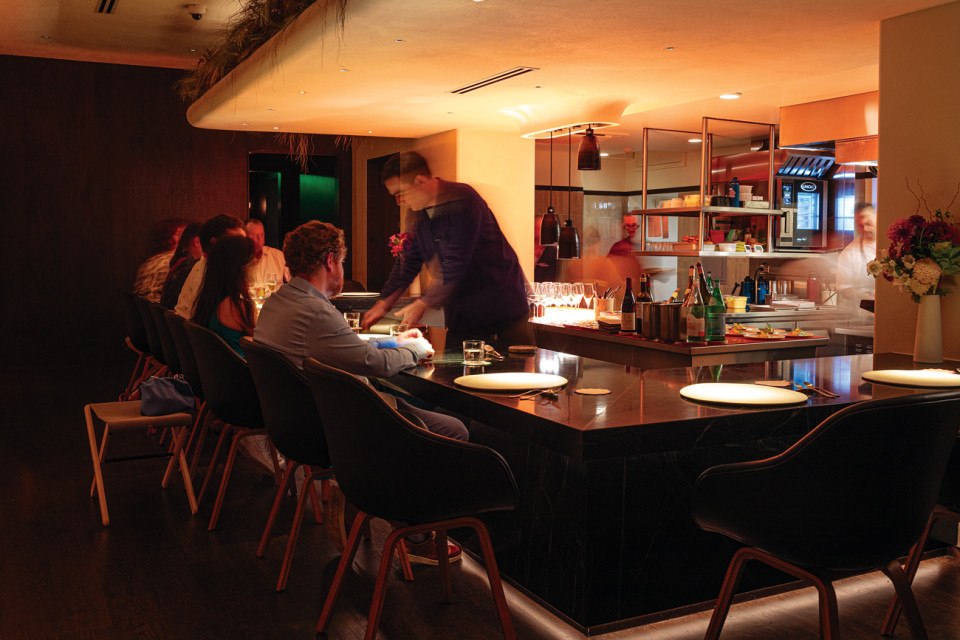
One of the first decisions Nich made was to reverse that ratio, which seems crazy, right? But wait.
From the start, Nich wanted a top-of-the-line stove in his kitchen. He’d cooked on a Molteni during a stage at Le Clarence in Paris while testing out menus for Provenance. Massive, gorgeous, solid — Moltenis take 500 hours to build and are made mostly of steel so they’re never meant to break. Nich was in love.
“It’s a very functional piece of equipment that also happens to be very beautiful,” Nich tells me, then nerds out over its specs for a solid 20 minutes. In the kitchen, he can’t pass by without touching it, wiping it down.
Also, it cost about as much as a luxury car. Moltenis are all custom and run anywhere from $50,000 to almost a quarter of a million dollars. Nich’s came in on the low end, but still, we’re essentially talking about parking a Jaguar in the middle of the kitchen just for funsies, and that’s crazy too, right?
Wait.
“Hey, Jason,” Nich shouts from another room. “You wanna taste some caviar?”
Gary the Caviar Guy comes walking into the basement prep kitchen. Shaved head, thick Russian accent. He looks like he’s auditioning for the part of Bad Guy #4 in the next John Wick movie. He finds a clear space in the pastry kitchen, sets down a bag, pulls out a small cut-glass jar and a bundle of caviar spoons held together with a rubber band. He opens the jar and hands out the spoons, and we taste. It is golden Osetra caviar — fresh, authentic, the real thing.
“What do you think?” Nich asks.
It’s probably the best caviar I’ve ever tasted.
“Yeah, that’s going on the menu tonight.”
And it will. From Holland to Philadelphia to Gary to Provenance, it will end up as part of tonight’s first course: a single oyster, some sweet potato mousseline, and a dollop of fish eggs that linger on the tongue like the taste of salt water from nearly 4,000 miles away.
Some quick psychological math:
A person buys a $50 chair because he needs a place to sit.
He buys a $500 chair because he wants people to see it, to notice it, to say, Hey, that looks like a $500 chair.
He buys a $1,200 chair so that people forget they’re sitting in a chair at all. Their butt doesn’t fall asleep, their back doesn’t hurt, they’re not hunched up or leaning. A person in a $1,200 chair is simply … present.
That’s why Nich bought $1,200 chairs for his dining room. So there were no chair-related distractions. Also, they were on sale.
He chose the space that he chose and dedicated only 40 percent of his square footage to dining space so that he would have 25 seats. Because buying 25 $1,200 chairs is a lot cheaper than buying 50 or a hundred. He did it so he only needed 48 expensive Bordeaux glasses, not a thousand. He did it so the heavy, serious silverware nested together at the service station fit on small trays.
He parked a Jaguar in his kitchen not out of vanity (or not purely out of vanity) but because that Molteni oven was the best piece of equipment available. It won’t ever fail or break down. Plus, it’s the only one in Philadelphia. One of only a handful in the entire country. “I wanted to create a kitchen that everyone would want to work in. And the equipment, I think, shows a certain sense of gratitude to the staff. Why wouldn’t I want to give them the best?”
In the prep kitchen, Nich hands me sprigs of absinthe marigold from his cutting board that taste like fennel, but perfect. Fennel the way you think fennel is going to taste but it never actually does. Chrysanthemum leaves like an un-spinach-y spinach.
Nich married his wife, Eunbin, when he was running the line at Good King. She’s a professor at Widener University, teaches accounting (her PhD is in restaurant accounting), and she’s the reason there’s kimchi fermenting in a reach-in. Not the only reason. There were research trips to Seoul and stages in Paris with Korean chefs in French restaurants that inspired Nich, but Eunbin and her family are a big part of it. Nich opens one of the meticulously organized reach-ins, finds a bag of kimchi, cuts it open, digs in a spoon, and holds it out to me.
“Taste,” he says.
“That’s fucking delicious,” I tell him.
“Mother-in-law approved,” he says with a smile.
Hours later, the absinthe marigold will end up on a plate of marinated vegetables, bulking up some quick-pickled fennel that “wasn’t fennel-y enough.” The kimchi will bleed into a beurre fondue with sea bass and pork belly. They’re working on a new dish of chicken mousseline with snails folded in, stuffed into scratch-made, shell-shaped pasta, but it isn’t ready yet. Not for tonight.
“I don’t care about recipes as much as I care about seasoning,” Nich says. “I don’t care about results as much as I care about intent. Cooking is not artistry. It’s just … not. Cooking is a craft. Artistry is artifice. Craft is everlasting. And everyone wants to cook in this kitchen.”
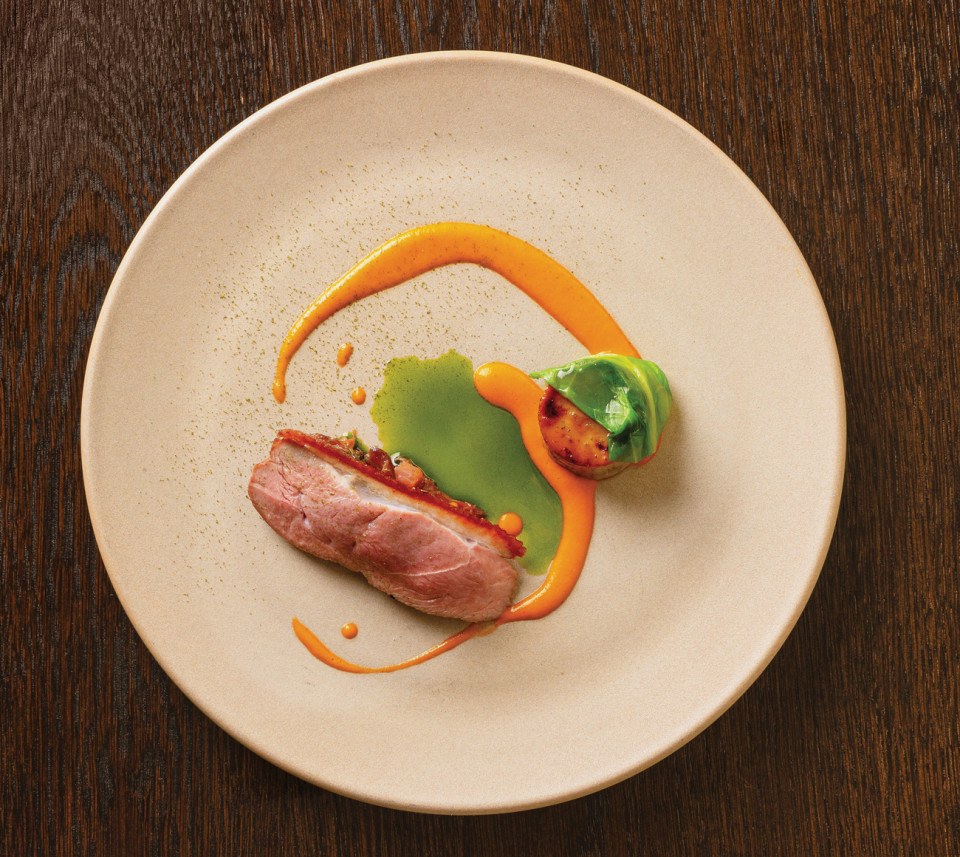
When Nich said that, he stressed the word cook. Because he was making a point that cooking is craft and his staff are craftspeople. That they’re all into this for reasons that rise above the shallow, disposable, surface concerns of mere artistry. But there’s a dichotomy there. You put the stress on a different word and it explains a piece of what he’s really trying to do at Provenance.
He said: And everyone wants to COOK in this kitchen.
But he also meant: And EVERYONE wants to cook in this kitchen.
Because that, ultimately, is his goal with Provenance. It’s why he designed it the way he did and budgeted the way he did and spent what he spent. It’s why he buys all his ducks from a single farmer and all his caviar from Gary. Because he is trying so, so hard to make a Philadelphian Noma. A French Laundry all his own. A world-class restaurant with a world-class kitchen that will attract the best cooks in the world to want to come here.
And that, too, is crazy, right? But I’m gonna ask you to take a breath. Stop for a minute. Think.
I want you to ask yourself one question.
Why not here?
Provenance had a budget of somewhere around $1.2 million. And, on one hand, that’s a lot of fucking money. But on the other, it’s such a tiny amount of money. You remember Bankroll? Tech bro Paul Martino’s luxury sports bar at the old Boyd Theater? That albatross cost $25 million to open. It lasted four months.
One point two million dollars. Plus some money from friends and family. Plus Nich maxing out all his credit cards. So call it $1.5 million. Or even $2 million. Know how he got that money?
“Me? As a chef, a line cook?” Nich asks. “I obviously didn’t foot the bill.”
No, he convinced people that his ideas for Provenance weren’t crazy. And he did it in the dullest, most banal way: with paperwork. With a business deck, P&L projections, a plan that showed him stable even with a half-committed dining room and a full staff. He used all the things he’d learned at La Peg and 13th Street and made his pitch, cashed the checks, built the restaurant.
“There is zero impulse in this space,” he tells me. “It’s not rooted in narcissism. Everything is calculated. My menu price is what my menu price is because that’s what a 27 percent food cost gets me.” He explains how, in the midrange of stock and supply, price fluctuations can kill you. A few-cent bump per pound in the cost of something you need a thousand pounds of? Extended across 10 different things? Over six months? That is how restaurants die. But at the high end — black truffles, Montauk red shrimp, Osetra caviar — the prices are remarkably stable. Oven breaks down? That’s $10,000 for a repair. Sewer backs up? That’s a night without service. He can plan for fixed costs. It’s the surprises that ruin the projections. “This?” he says, meaning Provenance, the system he’s built. “There’s no recipe for this. It’s the most sustainable model I can think of. But if I had gone halfway?” If he’d bought the $500 chairs and the farmed caviar, crammed more seats into the place? “I don’t know how that’s not translated to the diner.”
Something no one really gets about cooks, about restaurants unless you’ve spent a lifetime in them, is the quiet. The calm. Movies and TV shows only show the bad nights, the in-the-weeds adrenaline spike at 7 p.m. on a Friday night when the garde-manger is looped on cooking wine and the sous just lit himself on fire.
But the silent, brainless, blissful knife work of deep prep, or the soft moments, the familial ease? That is the gig. And the attraction too. It’s physical, technical, focused work. Repetitive, but soothing.
Provenance is one of the quietest kitchens I’ve ever been in. During prep and during service, no one shouts if they can just speak. No one says 10 words where three will do. They laugh, they joke. No one is freaking out about a missing pan or a lost delivery because those things don’t happen here.
Me? I’m freaking out a little. Because I’ve been watching prep for hours now, and, to my eye, it seems almost impossible that a dinner can come from this place.
I came up in a certain style of kitchen where the raised voice and the dread of service was my milk and Frosted Flakes. I ate it all day long. But this is not that. Because when half the inherent panic of a working kitchen is in desperately trying to fix those things that have been dropped, forgotten, lost, or ruined, or to cover for gaps in stock or staff, or to work around undependable equipment, and then, suddenly, all that stress is gone? Then the panic is gone too. There’s nothing but the work. And the work, by its very nature, is good.
But still, I’m freaking out a little. Nok from Kalaya is coming in tonight. And Peter Woolsey, Nich’s old boss from Bistrot La Minette and La Peg. There are 36 covers on the books, which means something like 900 plates. If it were me, I’d be losing my mind.
But no one around me is losing their mind. There’s no panic. Tension, maybe. A feeling like muscles tightening across your back as the clock ticks down. Nich calls for tasters and makes fine adjustments. Salt here. A little basil oil. Tangerine vinegar, from that messy rack in the back, “but just a little bit, okay? I don’t know. Just make it taste good, all right? So they can still taste the textures.”
Slowly, they will start loading in. The line coolers will get stocked (labels out, everything dated, perfectly aligned). Upstairs, the big Molteni will be adjusted for service and start filling up with pots and pans. The cooks who’ve spent all day working in t-shirts and long aprons, rolled chinos and work boots, will put on their white jackets and stand at their stations, waiting for the first guests to arrive.
From behind the line at Provenance, service is the dullest thing you can imagine. Quiet, calm, absolutely competent. This is a dance these cooks have been doing for weeks now. They know all the steps.
And there is no plate that isn’t beautiful.
Maine uni with gelatinized egg yolk the texture of country jam. A single littleneck clam with ’nduja oil and a basil leaf worn like a little hat. Mackerel with bone marrow bread crumbs. Pine mushroom bouillon. Two bites of ribeye with fennel foam and sauce américaine. The bluefin tuna is a cube, resting under the shavings of black Burgundy truffle that Nich was peeling a few thousand words ago. Abby’s apples become part of a mille-feuille, and her baguette looks like leaves on a vine.
The menu at Provenance will be different by the time you’re reading this. It’ll be different by the time I’m done writing this. “This?” Nich asks me, pointing. “This menu? This is just tonight.”
He tells me how, in 2012, he got his first iPhone. The first picture he ever took was of the chef’s table at Brooklyn Fare. He still has that picture.
“I want people to come here and have that teenage feeling, you know? Butterflies.”
Like they’re falling in love.
The plan, such as it is, is to be the best restaurant, period. The plan is to work like the Michelin Guide is already here in Philly, handing out stars.
The plan (and Nich always has a plan) is to just be really, really fucking good and, at the same time, be good, you know? Good food, prepared and served in an environment that is also good. Where everyone feels good. Where the customers and the staff are taken care of. Where part of the $225 price tag for his 25-course prix fixe is paying for the expertise of the staff, and for Nich’s expertise, too. A measure of trust that he has put in the legwork to find the best ingredients. That he already knows Gary the Caviar Guy and the farmer who grew the absinthe marigold and a dozen other suppliers who are getting him product that’s just better than what you’re going to find anywhere else.
“That’s part of my struggle,” he tells me. “Explaining that without being condescending or preachy.” Because in a city that already has Friday Saturday Sunday, that already has Ambra and Lacroix and Vetri and Roxanne, it’s a brazen move for some journeyman cook to come in and lay claim to any mantle of best-ness when no one even knows his name.
And Nich knows that. He understands that he still has to convince people he’s legit. That he has to earn that trust as if he were starting all over again in Jim Burke’s apartment.
More than any of that, though, the plan is that Provenance should be a Philadelphian restaurant. Because restaurants like Provenance already exist in other places. I ask him, and Nich rattles off names like he’s catching Pokémon: Atomix and Brooklyn Fare, Blanca, the Catbird Seat and Audrey in Nashville, SingleThread in Sonoma, the French Laundry (of course), Table by Bruno Verjus in Paris. And he could’ve gone to one of those places. Cooked. Been happy (maybe). But he didn’t want that.
“It should exist here,” he insists. “I never wanted to be the chef who went to Paris or San Francisco and then came back to show Philly what fine dining means. I love this city. And just because I’m doing something that is atypical of Philly doesn’t mean that I am not of Philly. I just don’t want to have to move to a different city to do this. I wanted to open the restaurant that I think Philadelphia deserves.”
So because Provenance didn’t already exist, he had to build Provenance. Because Philly deserves a restaurant like Provenance — a destination. A place you go to get things that you can’t find anywhere else. To have an experience you can’t find anywhere else.
At least not yet.
The last time I talked to Nich, I asked him whether he thought Provenance was going to last. Because if he’s trying to change the entire restaurant ecology in this city — if he’s trying to attract talent and attract diners, and the kind of suppliers who provide the product for this kind of high-end dining; if he’s trying to make a work environment where people are happy and where the only job is to make good things — then Provenance has to make it. It has to survive long enough to prove him right.
And Nich said yes. Of course. He wouldn’t have done this — risked this — if he didn’t believe he was going to make it.
“It felt like, to me, there was a race to do it,” he says. That Philly was at this point where it needed this. Someone just had to go first. And he was happy to be that guy because, if he was that guy, just imagine all the people he would get to bring with him. Just imagine what might come next?
“If this works, other people will open restaurants like this. And I hope other people do.”
Nich pauses.
“Because I really want to eat at those restaurants.”
Published as “Pride and Provenance”in the December 2024/January 2025 issue of Philadelphia magazine.

